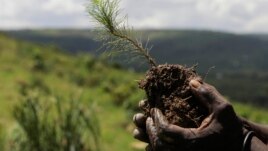22 January 2024
Enock Twagirayesu was seeking safety when he and his family fled violence in Burundi more than 10 years ago. They found it in Uganda. The small East African nation has taken in thousands of refugees from neighboring countries.
Twagirayesu and his family live in Nakivale Refugee Settlement, near the Tanzanian border. There were two children in his family when they arrived in Uganda. Today, there are eight children.
Growing families like his -- and the arrival of new refugees -- have put pressure on the land that makes up the settlement.

A sapling is held before it is planted inside Nakivale Refugee Settlement in Mbarara, Uganda, on Dec. 5, 2023. Refugees are helping to plant thousands of seedlings in hopes of reforesting the area. (AP Photo/Hajarah Nalwadda)
Twenty years ago, the area was a thick forest. Today, the trees are mostly gone. They have been cut down for cooking fuel. When Twagirayesu saw women digging up roots to burn a few years ago, he knew it was time to act.
"When the trees are finished, we will also be finished," Twagirayesu said. "Because if there are no trees to be used for cooking, even the people cannot survive."
Twagirayesu and two other refugees began planting trees in 2016. That early group quickly grew. Twagirayesu now leads the Nakivale Green Environment Association. Its members carry out what Twagirayesu calls the urgent business of reforesting.
Nakivale is the oldest refugee settlement in Africa. It has about 180,000 refugees. Some are from Burundi, while others are from Congo and Rwanda. New people come all the time. Once the refugees register with Uganda, they are granted a small piece of land on which they can live. They can build small homes and plant gardens.
Nsamizi Training Institute for Social Development is a local organization. It is supporting the tree-planting activities of Twagirayesu and others. The institute's yearly goal is to plant 300,000 trees.
On a recent afternoon, a group of refugees planted baby pine trees on a hill above a school. One of the school's teachers said she hopes the tree-planting project reduces the amount of water that runs off from rains. If it rains too much, the water floods the schoolyard and students are forced to stay inside.
Twagirayesu said the group has planted at least 460,000 trees in Nakivale. The trees are pine, acacia and bamboo. The refugees who plant the trees say being able to walk under the tree cover provides them peace.
But they also worry officials may one day want to send them home. They believe Ugandan officials may seek to protect the new trees and remove the people from the land.
But for now, Twagirayesu says, "when we are walking in the places where we planted trees, we feel much happiness."
I'm Dan Friedell.
Dan Friedell adapted this story for Learning English based on a report by the Associated Press.